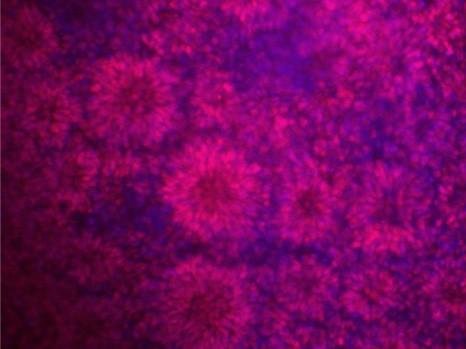Human embryonic stem cells, which can develop into any tissue in the body, have the potential to be downgraded into cells capable of growing into full embryos. Photo by Benchoua Alexandra/INSERM
WASHINGTON, Aug. 4 (UPI) -- Researchers devised a method to obtain in vitro totipotent cells, which are made up of 1 or 2 cells and are capable of producing an entire embryo, including the placenta and umbilical cord.
Before researchers at the French National Health and Medical Research Institute obtained totipotent cells, researchers had only been able to get pluripotent cells. As cells divide further from 1 or 2 cells, totipotent cells turn into pluripotent ones -- more commonly known as embryonic stem cells -- which can form into tissues found throughout the body.
When pluripotent stem cells are cultured in vitro, a small number of totipotent cells spontaneously appear. In a study published in Nature Structural and Molecular Biology, researchers explained comparing these cells to the ones present in early embryos to find their common charatericstics.
After noticing that DNA was less condensed in totipotent cells, researchers found that the amount of the protein complex CAF1 appeared to maintain the cell's pluripotent state. In mouse cells, the researchers were able to induce cells similar to totipotent ones in vitro by downregulating CAF1.
"Although induced reprogramming to pluripotency is well established, totipotent cells remain poorly characterized, and whether reprogramming to totipotency is possible is unknown," researchers wrote in the study. "We show that mouse 2C-like cells can be induced in vitro through downregulation of the chromatin-assembly activity of CAF-1."
"Our results suggest that early embryonic-like cells can be induced by modulating chromatin assembly."
The researchers said the new understanding of cell and embryo development may be useful in regenerative medicine.















